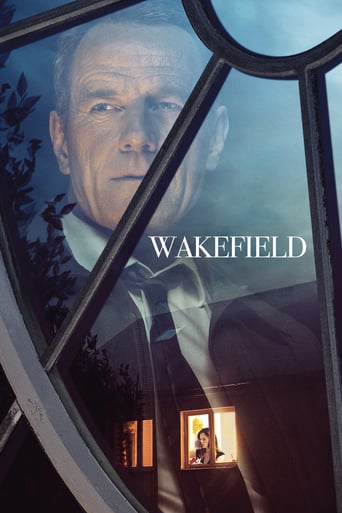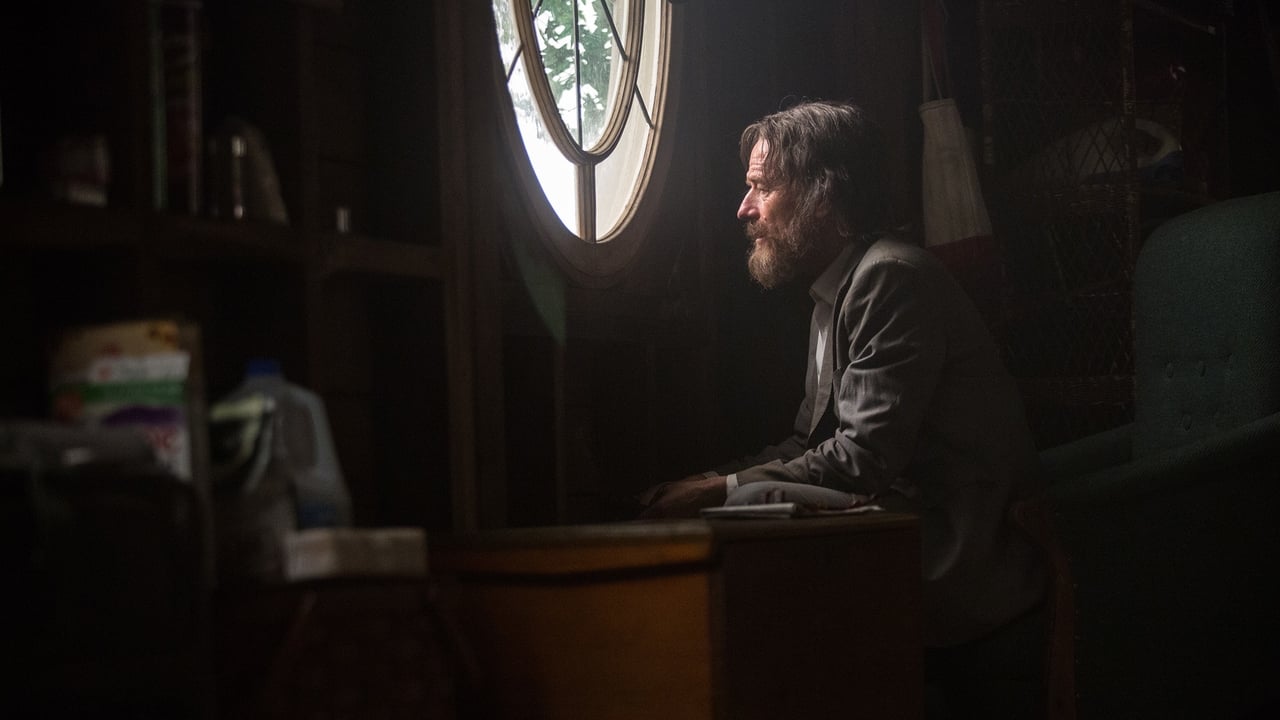Brakathor
To appreciate this movie, or at the very least the portrait that it tries to create, you have to understand the mind of someone with OCD. If you can't relate to the main character, then you'll probably find it very empty and pointless, because the film is essentially all about exploring a world of self-imposed deprivation, and all the bells and whistles that come with that. There's no deeper meaning; there are no overlapping plot tangents other than a briefly explored backstory to how our main protagonist got with his wife, and fought hard to get her, competing with his friend. This serves very importantly to show the force of will, ingenuity and determination that someone like this can and often does possess despite their frailties. The rest is all about exploring the journey which leads a successful, talented and hard working person to this sort of a life of scarcity.Personally, despite the film's shortcomings, I can relate very strongly to the film because I've lived it, minus wife and kids. I believe that in fact, a lot of people have experienced these moments of personal retreat to varying degrees, and it just often doesn't get exposed for what it is. Howard Hughes would famously lock himself in his room for extended periods, and live those moments of his life consisting of the most meagre quality of sustenance, one such time when he binge watched every single Katherine Hepburn film after having become enamored with her.In my case, when my disability made it so that I could no longer work, it very similarly forced me to retreat into myself as a desperate means to cling onto my independence. I'd just sold my house, and in the course of this, bought some properties up north to maintain some rental income to help support myself. Anyone who's undergone a serious move knows that it can be one of the most stressful experiences of one's life. Coupled with being in agonizing pain all throughout, the physical ordeal made things all the worse. We still hadn't secured a new property as our main residence, and were spending a couple weeks living in a filthy smoke infested basement suite. Right at the same time my renter had moved on, so I had to go down to the city and rent out my office unit, which at this point, despite being an ordeal in and of itself, was a welcome excuse to get away from it all.Once I got to the city is where things started to unravel, you might say. After I arrived, I had several rendez-vous to make: replace the keys, set up appointments, obtain internet, acquire furniture etc. At the end of the day, in complete agony, laying on a couch in an empty office unit staring at the ceiling, you're surprised to find yourself in a state of sweet surrender that's suddenly much more appealing than you ever thought it would be. You ask yourself "what's it going to hurt if I stay here for a few days to get my strength back?" Days turn into weeks, and before long you've made arrangements to replace your mobile internet with a full contract including landline telephone. We'd just got our new place, and I could have returned home after just a few days. A few days however, turned into 9 months.My experience was nowhere near as extreme as the one depicted in the film, of course. You can't COMPLETELY cut yourself off from the world around you while living in an office unit, and you do maintain many creature comforts: air conditioning, internet, refrigeration. Arguably you can't really cut yourself off to that extent while living in a garage attic either, so the film kind of forced the subject to an unrealistic extent. VERY unbelievable that a family, and indeed an entire neighborhood had nobody of sound mind to clock on that there was a familiar looking "homeless dude" living in a garage for months on end. The only ones to caught on were some special needs kids who in turn brought the guy food and supplies without telling a soul. You'd think this would attract MORE attention, but apparently not. While the plot integrity of the film may have been extremely lacking, it's still hard not to appreciate the portrait that it was trying to give us.It all comes back to self-imposed deprivation. Once you challenge your concept of what is and isn't normal or status quo, what may have seemed unthinkable becomes comfortable. You spend weeks living off canned fish, you pee in bottles, you give yourself sponge baths, and yes you sit around in your underwear most times to avoid stinky clothes, curtains drawn of course, as lawyers and accountants conduct business all around you. People come knocking on your door. At first you don't know how to respond, and by the time you're committed to showing yourself, the person has gone. Subsequently you become adamant about never answering your door. When the visits intensify you go out and print 10 or so signs saying "no soliciting" and literally "go away!" and plaster them all over your window. You then hear chatter "Some guy has locked himself in his office," but you don't care in the slightest. Instead you sit alone peering out your window watching people come and go and musing about all the familiar souls you see, all EXACTLY as depicted in this film, and yes, you quickly learn that it's impossible for anyone to see through the cracks of drawn blinds into a dark room. It's only possible to see out because the eyes simply can't focus on the dark of a surface that's mostly light. In the end, you spend most of your days in a dark room with the lights out, and it's true, people really don't know whether anyone is home half the time.The question is, why do it? I can imagine a lot of people would find this film ridiculous because they can't imagine how ANYONE could get to this point. The answer is really quite simple. If you're someone with OCD, you want everything to be perfect. If for whatever reason you find yourself at an impasse where things CAN'T be perfect and there's nothing you can do about it, rather than settle for mediocrity, you settle for something much much less. Why? Because whatever you're settling for is something you can control, and that's what it's about. When you hear of "hoarders," it's the exact same concept.At one point in my life I was a world traveler, and I fantasize about a time when I can do that again, so really this is fully different from something like agoraphobia, but even back then I can see how the same type of behaviour played out. In Asia for example, I was paranoid at the idea of taxi drivers cheating me on fares or bringing me somewhere against my will, so I insisted on walking every single place I went, 3 hour treks sometimes, hiking through the urban forest of concrete. In Auckland, I showed up at a hostel, and couldn't fathom the idea of staying in a grotty room with 6 other people, so instead I adopted a polyphasic sleep cycle and decided to stay nowhere, effectively living homeless for about 10 days. These are the things you do to maintain control. The film is about a man who feels weak, unimportant, unappreciated and desperately needs that sense of control back in his life, but doesn't know how to get it, so he retreats into himself. In the end it's an amazing character study and I appreciated this aspect of it, despite its faults.
subratadtt
What would happen if the movie was only just two min more long? Just wanted to what happens when he came back. It's really disappointing.
jimbo-53-186511
Successful and wealthy litigator Howard Wakefield (Bryan Cranston) suffers a nervous breakdown and decides to hide out in the family attic for several months. During these months, Howard observes his family continuing their lives without him and as time passes by his behaviour becomes increasingly erratic and he often wonders whether he can return back to his old life (or indeed if he wants to)...Wakefield bravely tries to tackle a rather complex issue - one of a man suffering a nervous breakdown which I suppose could be classed as a mental health issue. Howard, for me, was a rather complex character with a torrent of varying emotions - Cranston does an excellent job in trying to give some depth to his character. The issue I had is that I didn't find that the narrative had any real depth; the focus is on Howard spying on his family, but I found that the cause of his nervous breakdown was glossed over meaning that I could never identify with or really understand Howard's motivations. The film also doesn't show anything from his wife's perspective - Howard's narration gives us an idea of what she may be thinking, but more input or insight from her as a character might have made the film a tad more involving.Other more notable flaws/issues with this film lay with believability; I found it hard to believe that Howard could manage to hide out in his attic for months on end without being spotted by his family or any of his neighbours at any point - considering how often he is roaming around outside. Also I find it hard to believe that no-one would think to look in the attic at any point to see if he was hiding out in there? He steals food and drink from his own home, but his wife doesn't notice at any point. The idea of him also surviving for so long by eating thrown away leftovers is also something of a stretch in credibility. The main selling point with this film is Cranston; he gives the best performance by a mile and his multi-layered performance does make this film more tolerable than it otherwise would have been. Garner is OK, but she's given too little to work with to make an impression on the picture and the same can be said of the supporting cast.Wakefield for me was a disappointment and something of a missed opportunity - the script lacked the complexity and insight necessary to make this a good character study. I do like the idea of a man looking into his own life from the outside and seeing what life is like for his family without him being around (there are actually shades of It's a Wonderful Life in this film), but with so little depth to the script I basically found myself watching Cranston spying on Garner which after a while became rather one-note and tiresome.
rgreen7360-849-811928
First of all living in someones garage for a whole year and not getting noticed is impossible. This movie made no sense from start to finish.





 AD
AD













